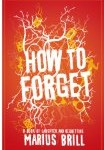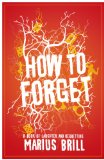Five words from the blurb: illusionist, forget, brain-scientist, experiment, adventure
I hadn’t heard of this book, but I received an email from its publicist and was instantly drawn towards the premise – I couldn’t resist a book that combined magic with brain science!
How to Forget is a fast-paced, complex adventure story which also manages to include details of scientific research into brain function and memory.
The central character is Peter, a magician forced to entertain the elderly after a children’s party went horribly wrong. Peter is also in a relationship with Kate, a con-artist wanted by the FBI. The pair become involved in an increasingly complex plot which is clever, but often difficult to follow. I frequently found myself re-reading sections in order to fully understand what was happening. I’m sure I’d benefit from starting the book again, just so I could pick up on all the details I didn’t spot first time around. This shouldn’t be seen as a negative – it shows a depth and intelligence not seen frequently enough in modern books.
The sections on human memory were thought provoking. The book suggested that people would be happier if they could forget certain aspects of their lives. I’m still thinking about the questions this book raised about who should be allowed to have their memory wiped and although this book is probably too long and complex for the average book club I think that many people would love to discuss the issues raised in this novel.
How to Forget has some of the cleverest plot twists I’ve come across. I loved the way it explained the tricks con-artists/magicians use to misdirect the public and how these were used to allow the characters to escape from various situations.
The mind is vulnerable and who we think we are can change entirely under all sorts of pressures: amnesia, fugues, false memory syndrome, alcohol, drugs, gods and even, for a split second, a pack of cards. Every day we see how susceptible the brain is to accepting false conclusions. How it can create connections and memories to explain the unexplained, in its insatiable eagerness to make sense of the world.
My main problem with this book was that I was so busy concentrating on the numerous plot threads that I was unable to bond with the characters. I also found some of the scientific study notes unnecessary. Despite these criticisms I was impressed by ambitiousness of this novel. It isn’t perfect, but I’ll certainly be thinking about it for a long time to come. Recommended.

.
If you’d like further information I found this interesting interview with Marius Brill on the Foyles website.

